China’s season of discontent: ‘Down with the Communist Party!’
The biggest show of defiance in the Xi Jinping era, the ‘white paper’ protests, have forced his administration to ease some of the world’s most stringent Covid controls
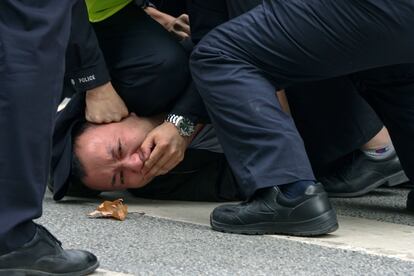

The heart of the old French Concession in Shanghai still retains some of its European charm amid the skyscrapers that engulf the neighborhood. Today it’s swarming with police – nine officers are positioned on a corner of the intersection where the first “white paper” protest erupted in late November. Blue crowd-control barriers have been set up in every direction, while merchants try to earn a living behind these new obstacles to trade in this business-oriented city. Police vehicles with flashing lights patrol the area nonstop. There is no sign of the demonstrations that began on November 26 in defiance of the iron-fisted anti-Covid measures first imposed almost three years ago. The social unrest that has spread across the country first flared up here when hundreds of young people began chanting shocking slogans heard around the world: “Down with the Communist Party! Down with Xi Jinping!”
“There is pent-up anger,” said a filmmaker in his late 30s who I interviewed in a trendy café down the street. Li (not his real name), a vivacious man who wears eyeglasses, is accompanied by a friend who was not at the protests. The friend had an old SLR camera slung over his shoulder. The two men, who speak perfect English, are polite, thoughtful and open-minded.

Li says he was tired that day after a hard day of preparing for an upcoming shoot, but when he saw the images being shared on Wechat (the Chinese WhatsApp), he grabbed his camera, hopped on a rental bike and rode to the protest without thinking twice. “I knew something special was happening,” he said. Although many pro-government pundits quickly blamed the protest on “foreign interests,” Li said frustration has been building since the pandemic began in 2020. “Nobody organized these people. Nobody told me to go. We just wanted to show our compassion and our empathy with those who lost their lives.”
It wasn’t supposed to be a protest, said Li, but a vigil for the 10 people who died in a fire in Urumqi, the capital of the autonomous prefecture of Xinjiang in western China. Many people immediately posted messages on social media faulting over-zealous lockdowns for the deaths – firefighters had been hampered by confinement barriers erected around the burning apartment building. Chinese authorities quickly denied the allegations.
“It’s the same old thing,” said Li, “there was no official statement.” He doesn’t believe much of what the government says anymore, and says there’s a generation gap between young, urban residents and an older, rural population whose only information source is the official propaganda. The tech-savvy youth know how to use virtual private networks (VPNs) to get information from the outside world, and gripe about how the authorities treat them like “little children.” In an extreme example of information control, Chinese television broadcasts of the FIFA World Cup avoid showing spectators not wearing facemasks.
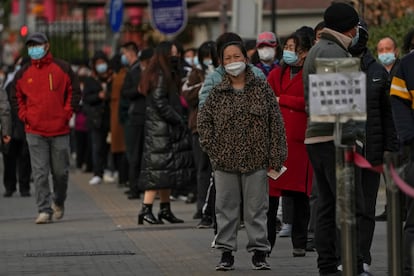
“At the beginning of the pandemic,” Li said, “we all had some confidence in the government. The country was doing well.” But that confidence ebbed late last year during a Covid surge. The rest of the world had found ways to coexist with the virus while China stubbornly stuck to its 2020 containment measures. The country remained closed to the world and continued its massive testing program, along with total and partial city lockdowns. China persisted with technology-driven, minute contact tracing using ubiquitous health apps that scan QR codes through Alipay and WeChat (the Chinese equivalents of Amazon and Facebook). Many of the protestors in Shanghai were heard shouting, “Fuck the QRs!” For many people, Big Brother has overstepped bounds in this public-health invasion of privacy that will never be restored once the pandemic is finally conquered.
The Urumqi fire sparked outbursts all over China. The vigil in Shanghai was intentionally held on Wulumuqi Street, which is pronounced “Urumqi” in Mandarin. It’s a fashionable part of town, a street lined with cafés and shops. To everyone’s surprise, hundreds of people showed up and a peaceful vigil turned into a vehement protest. The Shanghai tidal wave surged toward Beijing and 20 other cities around the country. According to the Australian Strategic Policy Institute, it was one of the largest displays of dissent in China during the Xi Jinping era.
The tragedy in Urumqi was the latest in a series of pandemic-related calamities. In September, 27 people died in a bus accident as they were being transported to a quarantine center. That incident sparked online vigils, but no one yet dared take to the streets. Xi Jinping’s regime has been quick to decapitate any social movements, dissent or activism in China over the last 10 years.
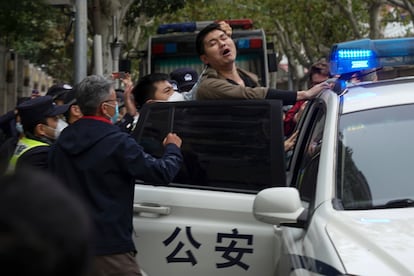
Xi Jinping won an unprecedented third term at the 20th National Congress of the Chinese Communist Party (CCP) in October. Two days earlier, a lone man hung two banners from a Beijing bridge. They called calling for Xi’s ouster and demanded, “We want food, not PCR [tests]” and “We want freedom, not confinement.” The man was arrested moments later, and no one knows what happened to him. That’s when the shift from tepid online reproach to real-world rebellion began. The lone protestor had inspired the most oft-heard words of the demonstrations: “We want freedom, not PCR tests!”
According to Li and the other people interviewed, this is the first major outburst of dissent “in 30 years.” The 1989 Tiananmen Square protests – an enormous taboo for Beijing – ended in a massacre that the Chinese people today only know about from family stories, travel abroad or by breaking through the China’s Great Firewall of internet censorship.
Li and his friend say the first time they saw a public protest was when they were college students in the United States. Donald Trump was in the White House and the streets were boiling with people angry about many issues, including the Black Lives Matter movement. “China has become an economic powerhouse in the last 30 years. We’ve been busy consuming and buying,” said the two filmmakers. “But we didn’t have this awareness until we went to the United States. We were born in the 1990s and haven’t experienced any social upheaval. We’ve only experienced the economic boom, which enabled us to travel and study abroad. Until now.”
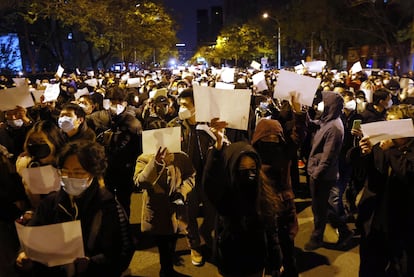
As a Covid precaution, the interview with Li and his friend takes place in the outdoor seating area of the café. It’s bitterly cold and the season’s first snow falls later that day. The zero-Covid policy doesn’t allow travelers to Shanghai to enter public establishments for the first five days of their visits and until they pass a string of PCR tests.
The protests have been a generational milestone, a baptism by fire in political dissent for Chinese born in the 1990s. Many have personally experienced repression for the first time, and numerous people have been arrested – including a BBC reporter – although there is no official count. Videos of clashes with the police circulate on social media.
The trauma experienced by Yang, a 27-year-old resident of Shanghai, is palpable as she recalls how security forces severely beat a fellow activist in the early hours of the protests. She is reluctant to share a video of what she saw because she doesn’t want to relive the experience. She relents and sends it via Telegram, a messaging app used by many young Chinese to circumvent government censorship. It’s only a few seconds long, enough to show a youth on the ground, apparently handcuffed, being viciously kicked by four men in dark clothes.
Yang says the boy was held in a van for what seemed like an eternity, and was finally released later that night. She knows five other people who were detained in Beijing and Shanghai, all of whom were later released. Yang also speaks perfect English, and makes a living as a freelancer in an industry she’d rather not name to protect her identity. She also attended a US college during the Trump years. “I think a lot of the people who participated in the protests have lived or studied abroad,” she said. “I was attending a very liberal, almost socialist college in the US when Trump was elected, and we all went to a lot of demonstrations.”
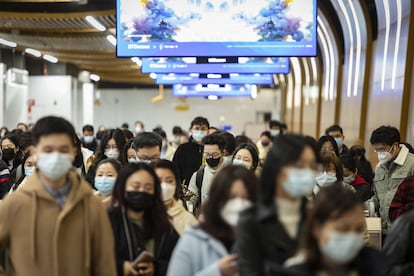
Yang gives a blow-by-blow account of the two days of protests in Shanghai, as if she wants to memorize the details so she doesn’t forget them once the zero-Covid policy ends. The government signaled that possibility when it announced an easing of certain measures in early December. As she speaks, it seems clear why many of those who participated in the recent protestors were born shortly after the 1989 Tiananmen Square massacre. It’s a generation, says Yang, that experienced the benefits of former President Deng Xiaoping’s reforms, an opening up to the world that continued under his successor, former President Jiang Zemin, who died this week at the age of 96 in Shanghai. In a strange moment of synchronicity, Shanghai police were deployed to the streets to quell protests at the same time an armed security force escorted the former president’s funeral procession. Hurricane winds were blowing.
Yang lives in a small apartment full of stuffed animals and Ikea furniture. A curious cat circles around as we talk. “Our generation benefited [from this period of reform and openness] because our parents were able to start their own businesses and earn enough to give us better educations. Most of us were only children [due to the country’s birth control policy].” She talks about how her generation has never known a world without the internet. Experts on their mobile phones, which are almost as necessary as air in China, they usually know what’s going on in their country and beyond the great firewall.
The recent uprising may not reflect widespread unrest, but it has revealed the frustration of an urban, educated generation resentful of three years of pandemic containment measures that have curtailed their ability to live, work, socialize and travel freely. It’s a generation of young people who don’t see much future in an introverted country with a dimming economy.
But these youths aren’t the only ones taking to the streets. Workers at China’s largest iPhone factory in Zhengzhou recently erupted violently in opposition to their workplace’s health measures. Workers from rural areas who migrate for jobs in Guangzhou’s textile workshops have also demonstrated against the ongoing lockdowns.
About the current protests, “They are but a teardrop in the ocean,” says a Shanghainese woman who was at Tiananmen Square. The 1989 Tiananmen movement was organized, massive and protracted, while the recent protests have been improvised and were stifled in just a few days. In this respect, they are very different movements, she says, but they both share a strong current of political dissent.
Xi Jinping hasn’t made any public statements about the recent protests, but he privately told European Council President Charles Michel during their quick meeting in Beijing that most were led by students frustrated with the multi-year pandemic. Xi also remarked to Michel that the omicron variant was far less contagious, which may be a hint that the zero-Covid policy is coming to an end. Some protesters see this latest turn of events as a victory. “I think the [protests] are working,” said Li, referring to the easing of restrictions in Xinjiang and Guangzhou. “It looks like things are improving.”
But others aren’t so sure. One of the protestors at the Liangma River rally in Beijing is a 31-year-old artist who has been messaging EL PAÍS through a system that circumvents government censorship. He says the day after that demonstration, he and several friends were contacted by police threatening arrest. He recently sent us another message about the reasons for his dissent. “I have lived a lie since I was born. We have been enslaved and forced to do as told. We have never had basic human rights, democracy, freedom of speech or constitutional rights.”
In his view, the zero-Covid policy is another piece of government machinery designed to perpetuate that lie, as it subjects people to never-ending mandatory PCR testing and confinement. But rebelling against these measures means risking government retaliation. “We are forced to live this undignified lie in order to survive,” he wrote. He also thinks that most of the protesters are just unhappy with the Covid policy, and that “they haven’t woken up and realized that this is a systemic problem.” He doesn’t think the protests will produce lasting changes in policy or government. “I’m more than unhappy – I’m desperate.”
The recent dissent has not been an organized or homogeneous movement. Many just wanted a return to their lives in 2019, before the pandemic. No one thinks the protests will gain much more traction, but they have served as a warning. “We want a normal life again,” said a 22-year-old student in Beijing who went by the pseudonym Peach. The young man was carrying a ream of paper that he handed out to any empty-handed demonstrators gathered at the banks of the Liangma River in Beijing. He wants the white sheets of paper to become a symbol, like the LGBTQ+ rainbow. Others were more radical. “I’m against the entire Xi regime,” said a 32-year-old woman who works as a musician in a band. She had come to shout with others and “wake up the people.” All around her, people were calling for an end to the PCR tests and confinements. David Bowie’s Heroes played on a loudspeaker, alternating with songs like the socialist standard, The Internationale, and the Chinese national anthem with its powerful anti-slavery chorus: “Rise up! Rise up! Rise up!”
Sign up for our weekly newsletter to get more English-language news coverage from EL PAÍS USA Edition
Tu suscripción se está usando en otro dispositivo
¿Quieres añadir otro usuario a tu suscripción?
Si continúas leyendo en este dispositivo, no se podrá leer en el otro.
FlechaTu suscripción se está usando en otro dispositivo y solo puedes acceder a EL PAÍS desde un dispositivo a la vez.
Si quieres compartir tu cuenta, cambia tu suscripción a la modalidad Premium, así podrás añadir otro usuario. Cada uno accederá con su propia cuenta de email, lo que os permitirá personalizar vuestra experiencia en EL PAÍS.
¿Tienes una suscripción de empresa? Accede aquí para contratar más cuentas.
En el caso de no saber quién está usando tu cuenta, te recomendamos cambiar tu contraseña aquí.
Si decides continuar compartiendo tu cuenta, este mensaje se mostrará en tu dispositivo y en el de la otra persona que está usando tu cuenta de forma indefinida, afectando a tu experiencia de lectura. Puedes consultar aquí los términos y condiciones de la suscripción digital.








































